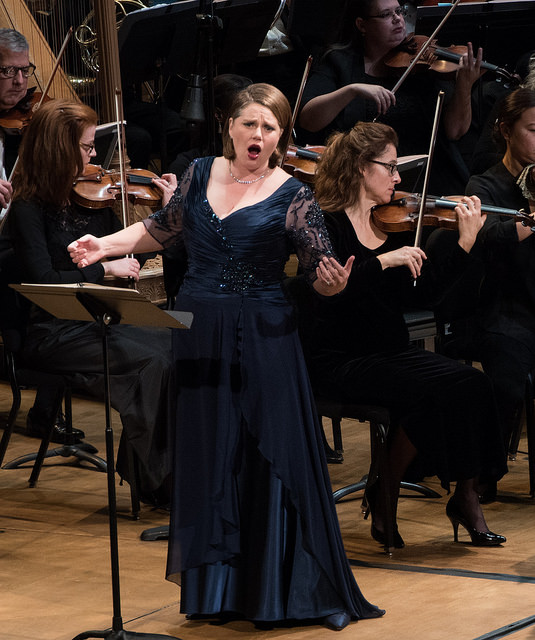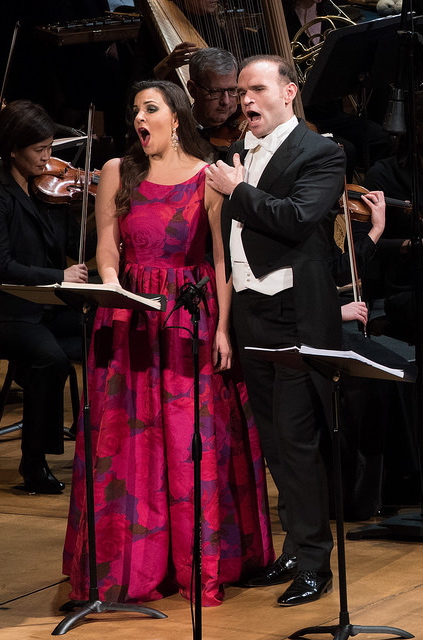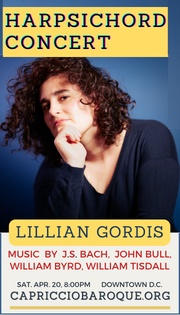Soprano Dana Beth Miller makes a searing debut in Concert Opera’s “Hérodiade”

Dana Beth Miller performed the title role in Massenet’s “Herodiade” at Washington Concert Opera Sunday night. Photo: Don Lassell
Twice a year Washington Concert Opera has the chance to give neglected operas another chance. Sometimes you stumble upon a work that should not have been forgotten. The company’s revival of Jules Massenet’s Hérodiade, heard on Sunday night at Lisner Auditorium, made it clear why you rarely hear this mildly suggestive work anymore. Although the score has a few beautiful moments, Hérodiade is an opera that can be hard to love.
Composed a quarter century before Richard Strauss’s Salome, on the same Biblical story, Massenet’s version could not be more different. In the libretto by Paul Milliet and Henri Grémont, loosely based on a Flaubert novella, Salomé and John the Baptist are star-crossed lovers, sung by a soprano and tenor. Salomé follows the prophet to the court of Herod in Jerusalem, where her mother, Hérodiade, who abandoned her years earlier, has caused scandal by marrying the divorced king. Not recognizing her daughter until too late, the queen causes her death along with the Baptist.
Last week the singer announced for the title role, Michaela Martens, withdrew for personal reasons. Her replacement, mezzo-soprano Dana Beth Miller, stepped into this challenging role with aplomb for a striking company debut. Hérodiade requires both force and expressive beauty, a spiteful villain with a tender heart. Miller had the searing vocal power, a dramatic laser beam of sound she deployed in her first appearance. The top of the range in the first scene, A-flat and then A-natural on the shouts of “Hérode,” was strong if a bit strident.
Miller gets marks for audacity for braving even higher outbursts later in the opera. At the end of the duet with Phanuel in Act III, Hérodiade is asked to hit a high B-flat that crescendos to a dissonant C-flat, at a fortissimo dynamic. Miller made a savage attack on these notes, giving the dramatic impression of coming off the rails.
Similarly, at the climax of Act IV, as Hérodiade realizes that her own daughter is cursing her (“Elle maudit sa mère!”), Massenet wrote a high B-natural, offering a slightly less terrifying alternate version that goes only to A. Miller went for the B with gusto, and the effect was just as unhinged as Massenet wanted (“avec un accent déchirant”), underscoring the character’s psychological anguish.

Joyce El-Khoury and Michael Fabiano in Washington Concert Opera’s “Herodiade.” Photo: Dan Lassell
Soprano Joyce El-Khoury had a relatively strong turn as Salomé, besotted with John the Baptist. A favorite at Lorin Maazel’s Castleton Festival in recent years, El-Khoury has often sounded underpowered against a full orchestra, but her voice continues to grow. She was not always the most musically responsive singer, seeming not to heed the gestures of conductor Antony Walker at one point in the first act. Her high pianissimo, crucial to the role, is pretty but can also sound disconnected from the rest of her voice. Her intonation was problematic at times, a heavy vibrato pulling the pitch downward.
The role of John the Baptist suited tenor Michael Fabiano like a glove, for his return to WCO after a fine Il Corsaro two years ago. His voice had heroic fervor for his condemnation of Hérodiade and especially his anguished plea to God in the dungeon scene of Act IV. Just as impressive was the soft sweetness he brought to the tender scenes with Salomé.
The Phanuel of bass Wei Wu was distinguished by its amplitude and tonal beauty, although the French was often hard to understand. As Hérode baritone Ricardo Rivera seemed to engage maximum vocal tension for little sonic payoff. The voice felt constricted at the top, and the legato for the big aria “Vision fugitive” needed more smoothness and rounding. Rising soprano Shannon Jennings had a pleasing cameo as Une Jeune Babylonienne, as did baritone Aleksey Bogdanov as Vitellius.
Antony Walker put together some excellent playing from his orchestra, including ethereal harp playing by Cecile Schoon McPherson and exotic saxophone lines by Steve Temme. The melting flute solo from Nicole Oppelt in the interlude between scenes in Act III was another highlight. The chorus had the necessary volume but was not always unified in its attacks and cutoffs.
Washington Concert Opera presents Beethoven’s Leonore 6 p.m. March 5. concertopera.org; 202-364-5826.







